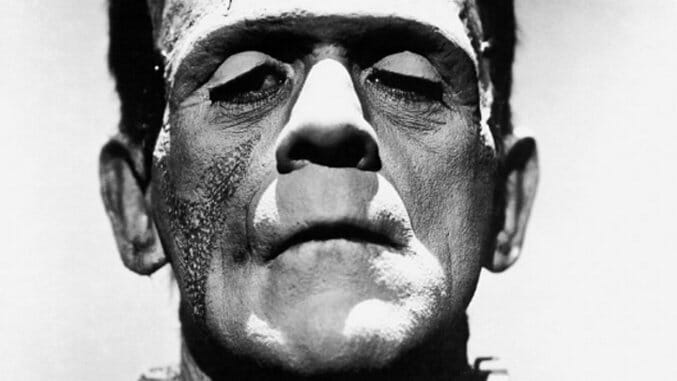In the Shadow of Frankenstein: Stephen Jones Reinterprets an Iconic Monster
Photo of Boris Karloff as Frankenstein's Monster
Mary Shelley’s abominable creature in Frankenstein has evolved over two centuries, essentially transforming into the patron saint of October’s macabre holiday. But who (or what) pops into your head when you read the name “Frankenstein”? Frankenstein’s monster or Dr. Frankenstein himself? Boris Karloff or Gene Wilder? Do you empathize with the image, or do you shudder? Or, perhaps, the words “It’s alive, IT’S ALIVE!” simply reverberate in your head.
We chatted with Stephen Jones, a London-based writer renowned for his expansive work editing horror anthologies, about his latest book celebrating the iconic monster. In the Shadow of Frankenstein: Tales of the Modern Prometheus collects two dozen works of short fiction demonstrating the immortal influence of Mary Shelley’s novel from 1818.
Horror vs. Tragedy vs. Science Fiction
“I think [Frankenstein] is often misperceived as a ‘horror’ story,” Jones says in a phone interview with Paste. “Although there are plenty of horrific elements—from its central premise that science can raise the dead to the fate that awaits many of its characters—it is at heart a tragedy. Many people don’t realize that the story is named after the creator, not his creation. It is really his story, his journey, not the Creature’s . . .”
But Jones recognizes that the “tragedy of the misbegotten Creature” often has the most significant impact on audiences. “It probably resonates with people due to Boris Karloff’s iconic portrayal of the Monster in the 1931 movie. Karloff—a more talented actor than most people gave him credit for—brought great pathos to the role and basically created the template interpretation that others have followed ever since.”
 That a certifiable authority of frights labels Frankenstein a tragedy may surprise you; Jones edits the award-winning series Best New Horror and published Horrorology: Lexicon of Fear last year. But he believes that his most important task as an editor is to transcend the bounds of a central theme or genre. So whereas you have your own preconceived ideas about Frankenstein, the monsters roaming the pages of In the Shadow of Frankenstein will seed some refreshed and poignant nightmares for you.
That a certifiable authority of frights labels Frankenstein a tragedy may surprise you; Jones edits the award-winning series Best New Horror and published Horrorology: Lexicon of Fear last year. But he believes that his most important task as an editor is to transcend the bounds of a central theme or genre. So whereas you have your own preconceived ideas about Frankenstein, the monsters roaming the pages of In the Shadow of Frankenstein will seed some refreshed and poignant nightmares for you.